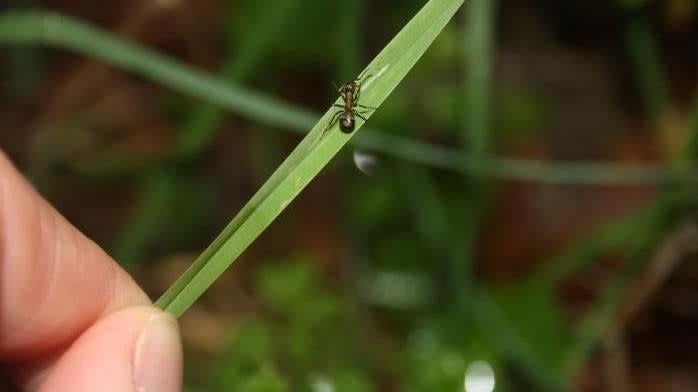Scientists Have Found the 'Zombie Switch' for a Brain-Controlling Ant Parasite

An ant infected by the lancet liver fluke.
Parasitic worms that zombify ants to do their bidding might be even more clever than we knew. Recent research has found that these parasites can not only compel ants to climb up blades of grass but also to climb back down when the weather gets too hot—all as part of their devious strategy to get eaten by larger animals to continue their complex life cycle.
The parasites are a type of flatworm known as the lancet liver fluke (Dicrocoelium dendriticum). These worms primarily live out their lives as adults inside cows or other grazing ruminants, but they take a long journey to get there.
Read more
Angelica Ross alleges "mind games," transphobia from Emma Roberts on the American Horror Story set
Ohio Police Tell Father His 11-Year-Old Is 'Making Porn' Despite Being Groomed by Adult Man
Bijou Phillips Files for Divorce From Danny Masterson After Reports Said She Was ‘Planning Appeals’
While the basic details of the lancet liver fluke’s life cycle are known, there’s much that scientists don’t understand about this complicated process. So a team of researchers at the University of Copenhagen’s Department of Plant and Environmental Sciences decided to look more closely. They studied more than 1,000 infected ants in the Bidstrup Forests near Roskilde, Denmark for 13 non-consecutive days over the course of a year, painstakingly tagging a subset of 172 ants for better observation.
The team theorized that several factors might affect the infected ants’ behavior, such as humidity and the time of day. But it was temperature that appeared to have the greatest influence. On relatively cool days, the ants stayed glued to the grass pretty much the entire time. But when the weather got warm, the ants crawled back down and seemingly went about their normal business. This meant that the ants were most often puppeteered by the worms at night and in the morning.
“Getting the ants high up in the grass for when cattle or deer graze during the cool morning and evening hours, and then down again to avoid the sun’s deadly rays, is quite smart. Our discovery reveals a parasite that is more sophisticated than we originally believed it to be,” said study author Brian Lund Fredensborg, an associate professor at the University of Copenhagen, in a statement. “We joked about having found the ants’ zombie switch.”
The findings, published last month in the journal Behavioral Ecology, highlight how little we still know about parasites in general, the authors say. And it will take more research to uncover the specific mechanisms that these flukes use to zombify an ant’s brain.
Thankfully, there’s no need to worry about being turned into zombies by these flukes. Humans do occasionally become infested by them, which can sometimes cause serious harm to the liver and bile ducts. But these infections are rare and humans are only an accidental primary host for the worm.
More from Gizmodo
The Continental review: One casting decision drags down Peacock’s John Wick prequel
Wild Starfield Exploit Can Net You 9 Million Credits In An Hour
Sign up for Gizmodo's Newsletter. For the latest news, Facebook, Twitter and Instagram.

